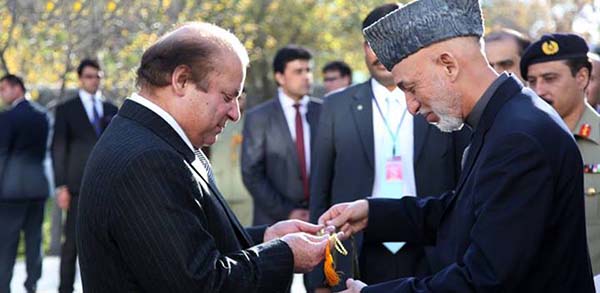Pakistan, US can make the Peace Process Succeed: Karzai
KABUL - Pakistan Prime Minister Mian Mohammad Nawaz Sharif, promising his support for Afghan peace negotiators to continue talks with the Taliban, on Saturday said an "inclusive political settlement" was key to sustainable peace in Afghanistan in 2014 and beyond.
"I urge all the stakeholders to seize this moment and join hands to support peace efforts," the prime minister told a joint press conference with President Karzai in Kabul.
At the press conference with Karzai, Sharif said it was imperative to reverse the destructive cycle of conflict and said Pakistan will continue to extend all possible facilitation for the Afghan peace process.
"This is the time to take decisive steps for moving forward the dialogue process and bringing it to a successful conclusion," he said.
Sharif’s trip at Karzai's invitation comes at a time when Afghanistan is preparing for crucial presidential polls and the drawdown of US and foreign forces next year.
Jockeying for a greater role in Kabul's troubled peace process with the Taliban, Pakistan has freed over 35 Afghan Taliban commanders to boost the peace process, a move yet to produce the expected results.
"We stand at the threshold of a consequential year in Afghanistan's history. In 2014, the Afghan people would take major steps towards becoming the masters of their own destiny. We welcome this milestone and wish our Afghan brothers well," Sharif said after one-on-one and delegation level talks between the two sides.
"Our vision of a peaceful and prosperous neighborhood can only be realized by having peace and stability in Afghanistan and by forging cooperative ties between Afghanistan and Pakistan," he said.
This is Sharif's first visit to Afghanistan since he assumed office in June. Prior to his departure, Sharif told reporters in Islamabad that peace in Afghanistan is a priority for Pakistan and all efforts would be taken to accomplish that.
"I wish to make it absolutely clear...A peaceful, stable and united Afghanistan is in Pakistan's vital interest," Nawaz Sharif said.
In Kabul, the Pakistani prime minister said an agreement had been reached with President Karzai on a mechanism to allow Afghan peace negotiators to continue talks with Mullah Baradar, the Taliban number two.
However, he did not provide details about the talks with Baradar, who was released by Pakistan in September. Replying a question, Sharif said Islamabad had already set free Mullah Baradar to speed up Afghan peace process.
After his meeting with Sharif, President Karzai said the High Peace Council Chief Salahuddin Rabbani visited Pakistan about ten days ago and discussed the peace process with Pakistani officials.
Karzai said he had discussed with Sharif how Afghanistan, Pakistan and the United States could work together to bring peace to the region.
President Karzai on Saturday stressed the role the U.S. and Pakistan needed to play in helping Afghanistan achieve peace.
"Pakistan and United States can make the Afghan peace process succeed and both countries should help us in peace negotiations," Karzai said.
To a question about allowing US troops to stay in Afghanistan, Sharif replied Afghanistan was a sovereign state and it had to take a decision on its own. “We stand by Afghanistan and will continue to do so in the future,” he said. Sharif also said he had discussed with President Karzai trade and energy issues.
Topics discussed between the two sides included a plan to expand an electricity distribution network, called the CASA-1000, to ship surplus power from the Central Asian states of Kyrgyzstan and Tajikistan through Afghanistan and into Pakistan.
Sharif also said he discussed with the Afghan president the TAPI project – a planned natural gas pipeline from Turkmenistan that will pass through Afghanistan to Pakistan and end up in India.
In his short speech, Karzai described terrorism as the common enemy of both the neighboring countries, saying he is hopeful both Afghanistan and Pakistan to overcome the menace of terrorism. (Pajhwok)

